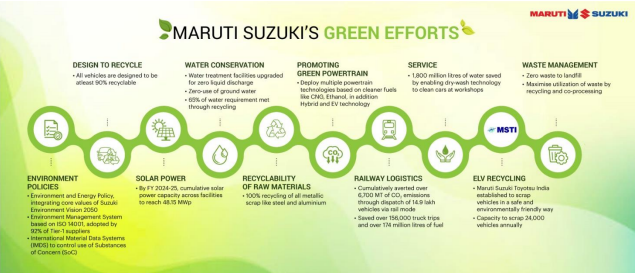Successfully sent!
Thank you for your interest in Maruti Suzuki Arena .
New Delhi: Accelerating efforts on the environment front and strengthening its commitment to carbon neutrality, Maruti Suzuki India Limited announced groundbreaking of two new solar power plants at its facilities. These two solar power plants, namely 1.85 MWp at R&D Centre, Rohtak and 20 MWp at Manesar will be commissioned in FY 2023-24 and FY 2024-25 respectively. With this, the Company’s total solar power capacity across all facilities will reach 48.15 MWp.
Besides, the Company is increasing the share of green power sourced from Haryana State Electricity Board for its consumption. These initiatives in solar power and green power will help the Company meaningfully shift its dependence towards renewable energy.
Elaborating on the Company’s efforts, Mr. Hisashi Takeuchi, Managing Director & CEO, Maruti Suzuki India Limited said, “We have been increasing the share of power generated through renewable sources of energy since the start of our first solar power plant in 2014. The announcement of the new solar power projects at Manesar and Rohtak accelerates our efforts in this direction. By FY 2024-25, more than 30% of our power requirement is expected to be met through renewable energy.”
He added, “The use of renewable energy is just one of the several initiatives that the Company has undertaken towards the environment. Right from product design to manufacturing processes, and distribution to end-of-life management, Maruti Suzuki has been making conscious and focused efforts on environment protection and conservation of natural resources. It has deployed systems and practices that relate to circular economy such as deploying 3Rs (Reduce, Reuse, Recycle) and eliminating waste. Besides, the Company is working on a slew of initiatives to bring down emissions across manufacturing, products and logistics.”

Highlights of some green efforts
To ensure that the vehicles are not wasted at their end-of-life, vehicles are designed for maximum recyclability and recoverability. All the vehicles currently being manufactured by the Company are at least 90% recyclable.
Maruti Suzuki recycles 100% metallic scraps such as steel and aluminum generated during vehicle manufacturing. In addition, the state-of the-art sewage treatment plants within the facilities help in recycling water. The Company meets nearly 65% of its water requirement for manufacturing through recycling. Further, through yield improvement projects, the Company, along with its vendors has been able to reduce the consumption of steel. Over 45% of packaging material for export of Knocked Down (KD) kits and components is met through reused material.
Maruti Suzuki is deeply committed to reducing carbon emissions from its fleet. The Company takes a comprehensive view to address the issue of decarbonization on `life-cycle’ and `well-to-wheel’ basis rather than limiting it to only a `tank-to-wheel’ basis.
The Company has the cleanest fleet among all passenger vehicle manufacturers in the country. (As per the Annual Fuel Consumption Compliance Report for FY 2021-22, published by MoRTH).
Continuing the decarbonization efforts, in FY 2022-23, Maruti Suzuki launched its first strong hybrid in Grand Vitara. The Company also expanded its CNG portfolio by bringing CNG on NEXA models and taking the total to 14 CNG models.
The Company is on course to bring its first EV, based on Concept eVX, by FY 2024-25. Maruti Suzuki vehicles are already compatible with E20 fuel (20% blending of ethanol with gasoline). Going ahead, Flex Fuel vehicles and Bio-CNG are some other promising options which the Company would pursue in its efforts towards decarbonization. The Company showcased its first flex fuel mass segment prototype previous fiscal year and is expected to be launched by FY 2025.
The use of railways for dispatches of finished vehicles is another area where Maruti Suzuki has strengthened its presence. The Company has gradually increased the use of railways for dispatching finished vehicles across the country. Through sustained efforts, Maruti Suzuki has dispatched over 14.9 lakh vehicles using the rail mode till FY 2022-23, cumulatively averting 6,700 MT of carbon emissions. In addition to significant carbon reduction, the initiative helps avoid congestion as well as save fuel. Railway dispatches contributed to over 17% of the Company’s total dispatches in the previous fiscal.
Issued by:
Corporate Communication
Maruti Suzuki India Limited,
1, Nelson Mandela Road,
Vasant Kunj, New Delhi
Email: corp.comm@maruti.co.in
Twitter: @maruti_corp
Website: www.marutisuzuki.com